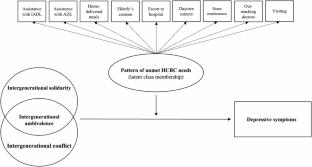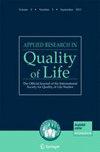Intergenerational Relationships and Depressive Symptoms among Older Adults: The Moderating Role of Unmet Home- and Community-based Care Needs
Abstract
This study explores the association between intergenerational relationships and depressive symptoms among older adults, with a particular focus on the moderating effect of unmet home- and community-based care (HCBC) needs. We first applied latent class analysis to categorize the unmet HCBC needs of older adults into three distinct patterns. We used these patterns as moderators to examine the effects of intergenerational relationships on depressive symptoms, focusing on the dimensions of solidarity, conflict, and ambivalence. Our results indicate that intergenerational solidarity significantly lowers depressive symptoms, whereas intergenerational conflict and intergenerational ambivalence intensify these symptoms. The influence of these intergenerational dynamics on depressive symptoms was moderated by the identified patterns of unmet HCBC needs. These results not only increase the understanding of the complex interplay between intergenerational relationships and psychological well-being but also highlight the need for effective policy and interventions that address both intergenerational dynamics and HCBC needs to improve the psychological well-being of older adults.


 求助内容:
求助内容: 应助结果提醒方式:
应助结果提醒方式:


